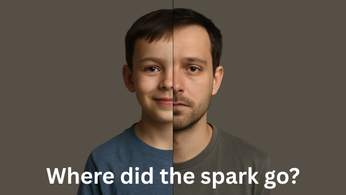
Gifted Kids: What Most People (Even Pediatricians) Don’t Know
Most doctors look for delays, not giftedness. Here’s what they often miss, and how to spot the signs yourself.
[Elementary 📚] • [Intelligence 🧠] • [Twice Exceptional (2e) 🧩] • [Discover 🔍] • [Insights 📊]
When you hear the word "gifted" what comes to mind?
A mini-Einstein? A pint-size Hermione Granger? Maybe a 5-year-old solving college-level math problems, or a toddler correcting grown-ups on their grammar?
Sure, some kids fit that mold. But most don’t.
And many gifted kids get missed entirely. Not just by schools, but even by doctors.
At GiftedTalented.com ("GT"), we believe giftedness isn’t just a score or a label. It’s about nurturing innate potentials, which include not just academic ability, but also creativity, leadership, entrepreneurial drive, compassion, and resilience.
For many families, raising a gifted child means following a different developmental path—one that deserves understanding, not assumptions.
Whether you're a student wondering why you feel "different," or a parent trying to make sense of your child’s quirks and questions, this article is for you.
Gifted ≠ Just Smart
Being gifted doesn’t mean you’re better. It means you’re wired differently.
Gifted individuals often have brains that race ahead—processing abstract ideas, noticing patterns, or asking existential questions before their peers can even pronounce the word “existential.”
But that advanced thinking doesn’t always line up with the rest of development.
A gifted 10-year-old might solve high school algebra but cry over a broken pencil or struggle with friendships. This is called asynchronous development—when intellectual, emotional, physical, and social growth don’t sync up.
It’s not a problem to fix. It’s a reality to understand.
But most pediatricians don’t talk about it. Because they’re trained to spot delays, not intensity.
What Pediatricians Usually Miss
Pediatric visits tend to focus on meeting basic milestones: Can they walk? Talk? Stack blocks?
But gifted kids often hit milestones early—or differently—and that gets overlooked.
Here’s what doctors often miss:
- Early milestones — Advanced speech, motor coordination, or reading skills
- Deep curiosity — Obsessive interests (dinosaurs, astronomy, coding… you name it)
- Big feelings — Strong empathy, perfectionism, or intense emotional responses
- Existential thinking — Asking about death, fairness, or justice at age 5
- Sensory intensity — Lights too bright, seams too scratchy, sounds too loud
- Mismatch in school — Getting bored, zoning out, or “acting out” from lack of challenge
These traits can get mistaken for behavioral issues, anxiety, ADHD, or worse, completely ignored.
The Risk of Misdiagnosis
Gifted kids are frequently misdiagnosed with:
- ADHD (it wasn’t that they lost interest, they became bored)
- Autism (they don't connect to peers, but they are aware of what's going on around them in society)
- Mood disorders (they feel deeply, not pathologically)
And for twice-exceptional ("2e") kids—those who are gifted and also have a learning disability—this confusion can be even more harmful.
Just imagine a teacher saying your kid isn't trying hard enough in math (because of dyslexia) while he/she is solving science problems five grades ahead.
Misunderstandings like this aren't just bad for academic progress, but also are confidence-eroding.
Why Some Gifted Kids Struggle in School and Life
When gifted students aren’t challenged (or worse, misunderstood) they can check out.
Some argue, withdraw, or act out. Others try to “dumb themselves down” to fit in. Some quietly disengage, losing motivation or becoming perfectionists, terrified to fail.
We’ve seen brilliant kids lose interest in learning altogether because no one recognized their needs, or no one believed them when they said they were struggling.
Giftedness isn’t a guarantee of success. It’s a potential that needs to be nurtured.
What Families (and Students) Can Do
Here's what we recommend if you’re a parent or a gifted student yourself:
- Look beyond IQ. Request a comprehensive neuropsychological assessment. Not just test scores—consider patterns of learning, working memory, processing speed, and emotional traits.
- Learn the signs. Giftedness isn’t just high grades. It’s about depth, intensity, and complexity.
- Find your fit. Search for schools, summer programs, clubs, or learning pathways that line up with your child's interests and pace.
- Speak up. As a parent, trust your gut—and don't stop asking questions. If you’re a student, advocate for yourself.
- Find your people. Gifted kids need people who get them, whether that is a mentor, a teacher, or a community like GT.
Final Thought: Gifted Kids Are Still Just Kids
Whether 8 or 18, gifted or not, every student deserves to feel seen.
Giftedness isn’t a prize. It’s not a promise. It’s just one way of being human.
And with the right support, gifted students don’t just survive—they flourish.
GiftedTalented.com
The world's fastest growing gifted & talented community








